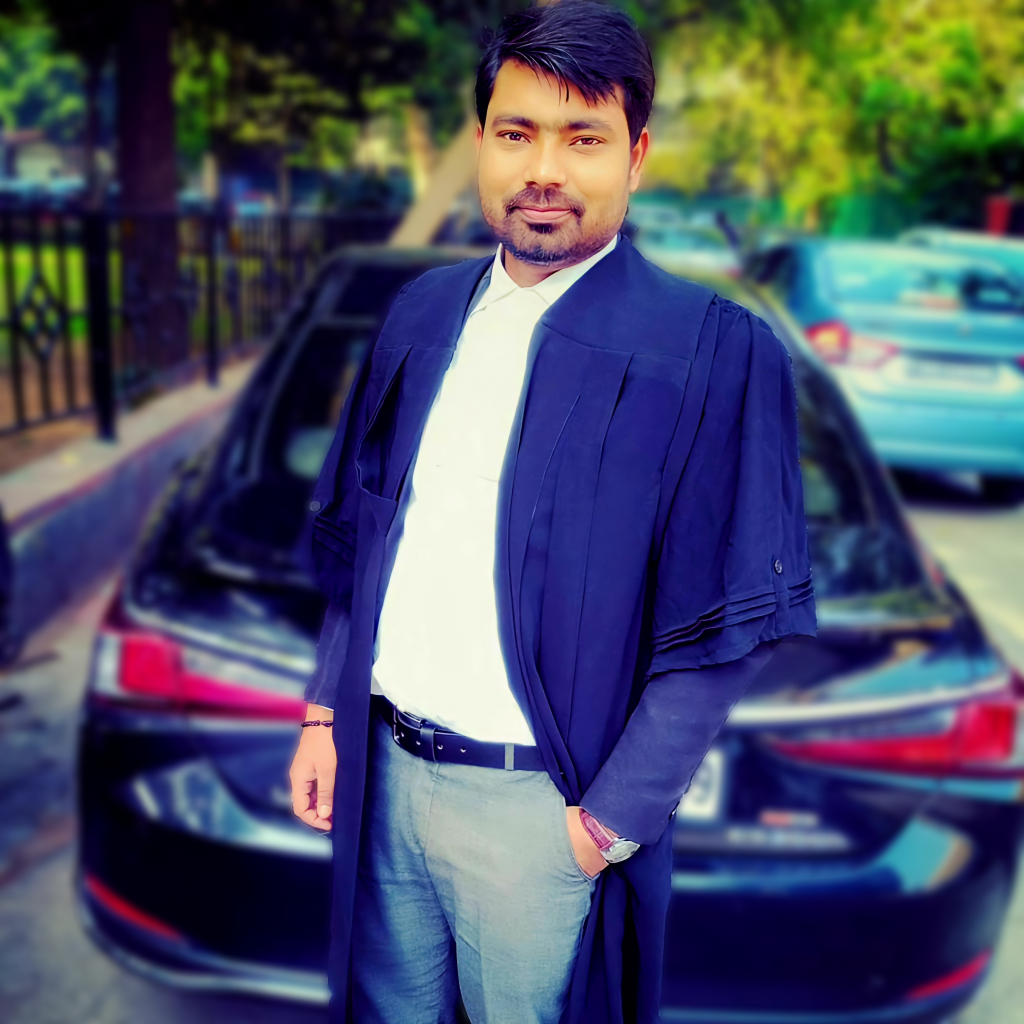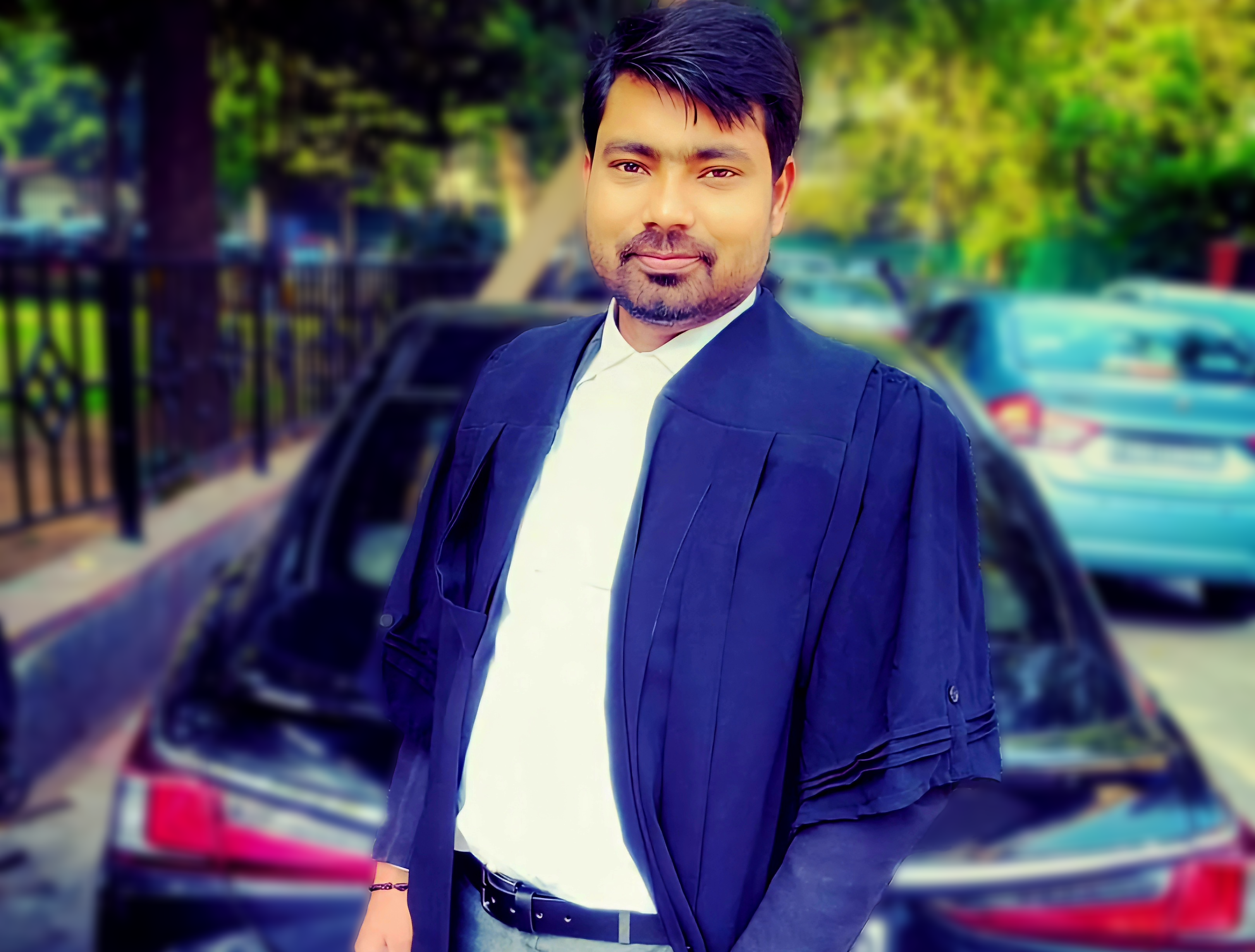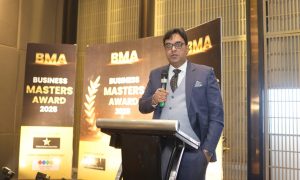This interview has been published by Namrata Singh and The SuperLawyer Team

You’ve had an impressive journey in the legal field. Can you share what inspired you to pursue a career in law, and how did you navigate your early years to build a strong foundation in this field?
My journey into law was shaped by a unique blend of family expectations and personal discovery. Growing up in a family with a strong tradition of public service, particularly in the Central Government sector, there was an implicit expectation for me to follow a similar path. My father’s distinguished career as a “Government Officer” set a high bar, exemplifying the respect, authority, and satisfaction that came with this role.
Initially, I ventured into Aeronautical Engineering in 2008, driven by my background in the science stream. However, after a semester, I realized that this field did not ignite the same passion I had observed in my father’s career. I was missing the sense of purpose and impact.
This realization led me to pivot towards a field of law that I believed could offer the opportunity to make a meaningful difference in society, much like the government service I had grown up admiring. I saw “law” as a path that could lead to either judiciary or advocacy, both of which aligned with my desire to contribute significantly to society.
My legal education and early career were driven by a passion for understanding and navigating complex legal systems, to create positive change. I laid a strong foundation by immersing myself in litigation, gaining valuable hands-on experience across various courts and tribunals under the guidance of excellent legal professionals practising in Delhi High Court and Supreme Court. This diverse exposure was instrumental in bridging the gap between theoretical knowledge and practical application, providing me with a comprehensive understanding of law that went far beyond what textbooks could offer.
During your time at LEX JURIS and SKC & Associates, you handled a wide range of cases across various courts and tribunals. What strategies do you find most effective in preparing for and managing high-stakes litigation?
When it comes to high-stakes litigation, I believe in thorough preparation using tried-and-true methods. My approach starts with diving deep into the core of the case through legal research and understanding the correct facts of the case. I make sure to note down all relevant precedents that could support my case. A crucial part of my preparation involves anticipating what arguments the opposing side might present and observing myself in his shoes.
Before stepping into the courtroom, I always ensure a few essential elements are in place. First, I develop a solid case theory – this is our roadmap for the entire litigation process. Then, I create a concise summary document “by hand-noting” that helps me remember all the critical points of our case. Still, I always make a diagram of the whole story of the case on the first page of the file, a diagram structure as it helps me to remember the cruciality of the case. It is also fundamental to gather and organize all the key facts from my client, ensuring nothing important is overlooked.
Furthermore, understanding the framework and operation structure of the Client’s business helps me a lot to represent my case before the Court as it makes it easy to judge/presiding officer, how this person’s business works and why the dispute arose, which the relief I am asking for my client.
Sometimes, complex cases require additional expertise. In such situations, I do not hesitate to collaborate with senior advocates. Their experience and insights can provide valuable direction to our litigation strategy.
This comprehensive preparation method, combining detailed research, strategic thinking, and collaborative efforts when needed, forms the backbone of handling a high-stakes litigation.
You started your career in litigation, representing clients in court, and later transitioned to an in-house counsel role. What motivated this shift, and how did your litigation experience influence your approach to handling legal matters within a corporate environment?
My time in litigation was incredibly valuable, and I am truly grateful for the guidance and learning opportunities provided by my senior advocates as well as by the Hon’ble Judges. They gave me a solid foundation and the right environment to grow professionally.
In my early years as a litigation lawyer, I learned crucial skills about how to structure a case. I discovered the importance of presenting arguments in a way that clearly shows why my client deserves the relief they are asking for. This involves carefully organizing facts, legal points, and evidence before presenting them to the court.
While practising as a litigation lawyer, I also obtained insights into “why disputes often end up in court”. While there can be many reasons, I noticed that “commercial litigation” frequently stems from two main issues:
1. Unclear or confusing terms in business contracts
2. Misunderstandings or disagreements between parties involved in a transaction
Recognizing these common causes of litigation sparked my interest in preventing legal issues before they escalate to court battles. Thereafter, I decided to shift to the corporate sector so I may construct a better foundation and avoid potential disputes as well as financial stability too.
Having transitioned from working in law firms to an in-house counsel role, what key differences have you noticed in the approach to legal issues? Please share your experience.
In-house work requires a more holistic approach compared to law firm practice. In law firms, I primarily dealt with issues after they had escalated into disputes. As an in-house counsel, I now focus more on preventing legal problems before they arise.
As an in-house counsel, I am much more integrated into the company’s day-to-day operations and strategic planning. This allows me to understand the business context of legal issues better.
In a law firm, the focus was often on winning cases. In-house, there is a greater emphasis on managing risks and compliances. I now assess potential legal issues in terms of their business impact and help the company make informed decisions about which risks to take or avoid.
While law firm work often allows for specialization, as an in-house counsel, I deal with a wider range of legal matters. This requires me to have a broader knowledge base and to be more versatile in my approach as well as I may learn more and more in my career.
In-house work involves more interaction with various departments and levels of management. I need to communicate legal concepts to non-lawyers and miscellaneous department and further balance legal considerations with business objectives.
Unlike in a law firm where client relationships might be more transactional, as an in-house counsel, I am invested in the company’s long-term success.
My litigation experience now serves as a foundation for preventive law. I use my knowledge of common dispute causes, like unclear contract terms, to draft better agreements and advise on potential pitfalls in business decisions. My contribution and suggestions may help my organization to grow in an organized manner
As an in-house counsel, I am often involved in strategic decision-making processes. My role is not just to provide legal advice but to help shape business strategies that minimize legal risks.
Overall, the transition has shifted my focus from resolving conflicts to preventing them, from specialized legal work to a more holistic business-oriented approach. This in-house role allows me to use my legal skills in a more preventive and strategic manner, directly contributing to the company’s overall success and risk management.
The shift from working in law firms to becoming an in-house counsel is much like moving from being a mason to becoming the architect of a building. By being the architect, I can now avoid potential risks and build a good foundation for the entire structure.
As an in-house counsel, you’ve advised management on regulatory compliance issues. What do you see as the biggest challenges for companies in maintaining compliance, and how do you stay updated with changing regulations?
As an in-house counsel, I have found that advising on regulatory compliance is much like ensuring our building meets all the necessary codes and standards. India is an evolving country day by day and those rapidly changing regulations across various sectors is a significant challenge. Further, many regulations are intricate and can be interpreted in multiple ways, being complicated sometimes.
As still in India for any sector, there is no such thing as a “One Window Solution”, where you may find all the compliances at once, so you have to follow several rules and regulations together without executing any contradiction and also following the interest of the Company. Operating a business in India has several major challenges due to the long processes of compliance and obtaining those approvals.
For companies operating in multiple regions, complying with different sets of regulations is often too hectic. Ensuring that this compliance does not hinder business operations is also a big challenge.
I keep myself updated on specific regulations belonging to my company’s business by continuous learning through webinars, seminars, my consultant newsletters. I also subscribe to legal journals accordingly.
Maintaining a strong network with professional legal associations and collaborating with external consultants and experts in the legal industry also provides help. Further, now in this Digital era, using technology and the internet helps corporate lawyers to track their compliance management and ensure all aspects of such requirements.
Legal research and writing are critical aspects of your role. How do you approach legal research, and what tools or methods do you find most effective in ensuring thorough and accurate legal analysis?
For legal research, I rely on a combination of online databases, legal journals, and case laws. Cross-referencing multiple sources ensures accuracy and comprehensiveness. Even, having such great mentors and seniors also guided me from time to time, whenever required, and through their vast experiences in the legal field, I got a better and wider approach to research and writing.
When it comes to legal research and writing, I think of myself as a student preparing for a really important exam. This mindset helps me stay thorough and focused.
First, I start by clearly defining what I’m looking for. This helps me stay on track and not waste time. I use a mix of online and traditional resources. Online databases like indian kanoon, scconline etc. are great for finding recent cases and laws.
I always cross-check information from multiple sources. This helps make sure I’m getting accurate and up-to-date information. When I find something useful, I take careful notes. I write down where I found the information so I can easily go back to it later.
I also try to understand the context of the laws or cases I am researching. It is not just about finding a rule, but understanding why it exists and how it has been applied.
For complex topics, I sometimes use mind maps or flowcharts to organize my thoughts. This visual approach helps me see connections I might have missed.
I always aim to write clearly and simply, like I am explaining it to a non-lawyer. This helps ensure that anyone reading my work can understand it easily.
Finally, I always double-check my work and, when possible, get a colleague to review it. Fresh eyes can catch things I might have missed. This approach helps me be thorough in my research and clear in my writing, which are key to providing solid legal analysis.
Reflecting on your career journey from a Junior Advocate to an In-House Counsel, what advice would you give to young lawyers who aspire to follow a similar path?
As a young lawyer, your early career should focus on gaining diverse experience, especially in litigation. This courtroom work will prove invaluable, even if you plan to move in-house later. Developing strong research and writing skills is crucial, as is maintaining an unwavering commitment to ethical practice.
Don’t underestimate the power of networking and continuous learning for career growth. Two often overlooked but critical skills are observation and active listening.
By carefully listening to your clients, you’ll build a stronger case and resolve issues more effectively. Meanwhile, keen observation in client meetings and in court will provide you with a broader perspective on your career. There’s much to learn from watching senior advocates in action and paying close attention to judges’ explanations.
These experiences can reveal new angles to cases you might not have considered before. Remember, the legal profession is as much about constant learning and adapting as it is about applying the law. By staying curious, ethical, and open to new experiences, you’ll set a strong foundation for a successful legal career.
As a lawyer, it is beneficial to adopt what we call the “T-shaped” approach to your professional development. Picture the letter “T” – the horizontal bar represents a broad, general knowledge, while the vertical bar signifies deep expertise in a specific area.
This means you should strive to gain a wide-ranging understanding of various sectors and how they operate. Familiarize yourself with different industries, business models, and how companies function in general. This broad knowledge forms the top of the “T” and gives you valuable context for your legal work.
However, the vertical bar of the “T” represents your core expertise – the law. In this area, you need to excel. Your legal knowledge and skills should be deep, thorough, and constantly refined. This is where you focus most of your energy and become a true expert.
You’ve done diplomas in Advanced Contract Drafting and International Contract Negotiation. How have these certifications enhanced your ability to negotiate and draft contracts, and what are the key elements you focus on during negotiations?
I am currently 60% through a Diploma in Advanced Contract Drafting and Negotiation, which has significantly improved my skills. I have also enrolled myself in 4 other Diploma courses in Law Sikho, which have also started simultaneously. I have learned to focus on clear language, anticipate disputes, and cover all key elements in contracts. The course has changed my perspective on contract drafting for modern entrepreneurs, showing me how to mitigate risks with crystal-clear drafting.
It has also enhanced my negotiation skills, teaching me to evaluate the purpose, identify specific terms, consider past limitations, stay informed, listen patiently, control my reactions, stand firm on non-negotiable points, avoid suggesting alternatives, and close negotiations effectively. This learning has transformed my approach to both contract drafting and negotiations, equipping me to better serve my company and clients in today’s business environment.
The legal profession is constantly evolving, especially with the rise of digital technologies and changing regulations. How do you stay adaptable and continuously improve your skill set in such a dynamic environment?
To stay adaptable and continuously improve my skills in the dynamic legal environment, I employ a multifaceted approach. I prioritize ongoing education through formal courses and diplomas, as evidenced by my current studies in advanced contract drafting and negotiation. I embrace new technologies and understand their impact on legal practice.
Adopting a ‘T-shaped’ skill set, I maintain broad knowledge across sectors while deepening my legal expertise. I adapt my communication and drafting skills to meet modern clients’ needs, focusing on clarity and efficiency.
Continuously refining my negotiation techniques, I emphasize understanding business objectives and finding mutually beneficial solutions. I network with peers, attend conferences, and stay open to emerging areas of law. A client-centric approach keeps me attuned to changing industry needs, while I also develop crucial soft skills like emotional intelligence and problem-solving.
Regular reflection on my experiences, such as my evolved perspective on contract drafting, ensures I am constantly improving and providing relevant, valuable legal services in this ever-changing landscape.
Law can be a demanding profession. How do you manage the balance between your professional responsibilities and personal life? What strategies do you use to maintain your well-being while handling high-pressure legal work?
Balancing professional and personal life is a constant challenge, but it is crucial. To manage this, I employ several strategies. I prioritize effective time management, set clear boundaries, and practice stress-management techniques like meditation. Maintaining a regular exercise routine and a strong support network also helps me navigate the high-pressure nature of legal work. Additionally, I ensure I take regular breaks and vacations to recharge.
Rather than adhering to a standard corporate culture, I believe in focusing on the desired outcomes for the company. This means I do not feel the need to be bounded by a rigid 9-to-5 framework. Instead, I concentrate on resolving issues and finding a healthy balance between my professional and personal life. Ultimately, maintaining good mental health and a stress-free mindset allows me to better overcome the hurdles faced by the company.
Get in touch with Yogendra Bhaskar–


























